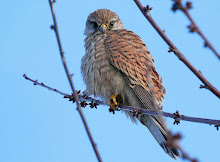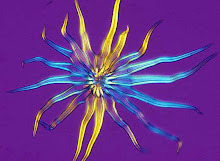We've been confined close to home for nearly two weeks now, and with the Coronavirus lockdown in place we only leave home very early in the morning, when no one is around, for the regulation exercise walk. At that time of day we see very few people and we all pass one another at a safe distance, with just a cheery greeting.
We are fortunate because there is a network of footpaths and lanes on the edge of our little market town, that start just a couple of hundred yards from our front door.
Some of the lanes like this one, known locally as the Mile Lonnen, have old hedgerows and trees but large areas of land here were opencast coal mined about 25 years ago, and have slowly been recovering. When the mining finished they restored field boundaries with miles of new hedges and dry stone walls and planted shelter belts of trees that are now well developed and form wildlife corridors. They also left a large pond.
Walking the same route every morning has a great deal to recommend it, because you soon get to notice small changes, especially at this time of year when spring is gathering pace.
One of the delights has been the realisation that there is so much bird life in these edgelands, close to home. So here is a photographic record of sightings in the first week of lockdown.
Blue tit in a larch plantation
Bullfinch feeding on cherry plum flower buds
Soaring buzzards, above a conifer plantation that is a probably their nest site
Chaffinch
Curlews, that feed in the fields here on their way to nest sites on fellsides in Weardale
Goldfinch
Great tit
Heron
House sparrow
Tree sparrow
Some fine aerial displays by lapwings
Robin in full song
Skylarks making song flights soon after sunrise
Song thrush
More willow warblers arriving every day
Counted six pairs of yellowhammers. The combination of hedges, broad road verges and pastures suits them well
Numerous dunnocks, aka hedge sparrows
Rooks feeding on leatherjackets (cranefly larvae) in the pastures
Jackdaws on a farmhouse chimney pot
Also seen but not photographed: sparrowhawk, magpie,carrion crow, starlings, coal tit























































No comments:
Post a Comment
Note: Only a member of this blog may post a comment.